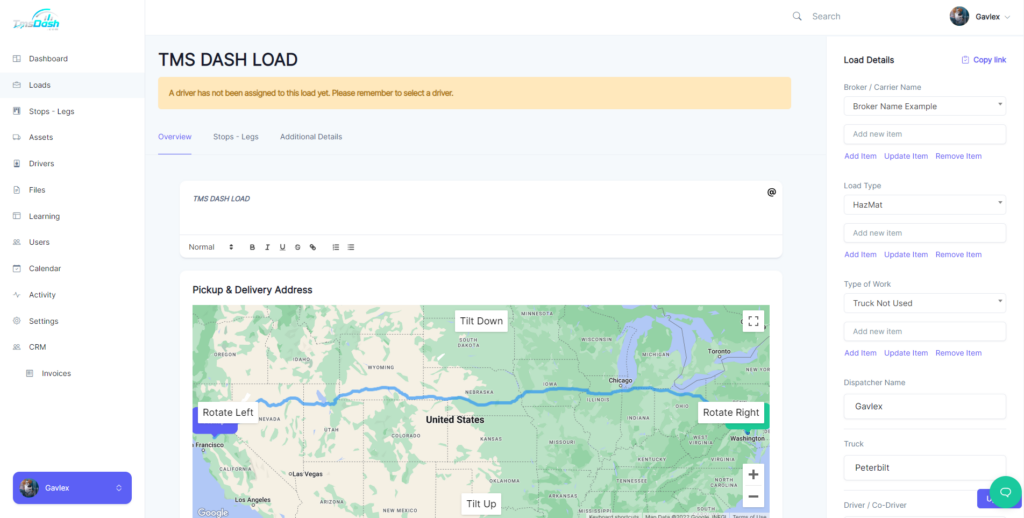Benefits of Using a Transportation Management System for Brokers and Carriers

Freight brokers and carriers play a significant role in the transportation and delivery industry. They help in smoothly managing cargo shipments while saving costs to the benefit of the customers as well as the transportation businesses. For this purpose, a Transportation Management System, or TMS is used, which simplifies the process of searching for and acquiring the most appropriate trucking company for every consignment.
What is a Transportation Management System?
A TMS system is software specifically developed to assist brokers and carriers in the efficient management of freight brokerage operations. It includes various tools to aid in streamlining the everyday tasks of a transportation company regarding the transportation of various goods and products, providing all-time information about freight, and automating every single move in the process of load delivery. It ensures that the whole shipping process is well-documented and automates the whole process of dispatching and tracking a shipment.
A TMS system performs several functions for transportation companies that fully automate their supply chain process. This includes coordinating the shipments, accessing the carrier, and electronically documenting the shipping process. Its tracking feature provides in-time information to the customers regarding the status and expected delivery date for a shipment, which helps companies improve their customer service, thus boosting sales. The system acts as a central hub that controls all transportation operations and manages all the logistics.
If with all the features stated above, a broker still follows the traditional operational approach by relying on obsolete and time-consuming methods, for instance, telephone calls, fax, and electronic mails, they’re missing the full potential their business can reach by using the streamlined and automated operations of a TMS system.
What does TMS offer for Brokers and Carriers?
In the current era of e-commerce, new markets are emerging worldwide, and businesses are seizing this opportunity by operating in a volatile environment using the on-the-rise digitized transportation services. In this scenario, it makes sense that the TMS systems are being used more and more by retailers, distributors, and manufacturers, owing to their benefits.
According to an estimate, the Transportation Management System market is going to touch nearly $28 billion in 2027. Companies in all the different sectors that deal with logistics can take advantage of a TMS system. Some benefits are listed below:
Minimized Paperwork
Using the traditional approach involves a lot of manual spreadsheets and typing. Switching to a TMS system for all operations enables the companies to automate all their accounts and save valuable time that was first used up in tiring and never-ending paperwork. It also saves hard-earned money by greatly reducing administrative costs. Using the TMS system significantly eliminates the chances of making a blunder involved in manual operations such as an erroneous invoice or a billing mistake, thus increasing the overall operational productivity.
Increased Customer Service
A broker or carrier-specified TMS improves customer experience and enhances customer service by employing available data to track major performance statistics like timely delivery and damage rates. The information available with a TMS system can then be used to eliminate encountered problems such as concerns about transportation affiliates and in-house drivers and replace them with high-performing options.
Reduced Freight Costs
Using a TMS system for brokers and carriers helps a company in immense growth as it considerably reduces freight costs. The system analyzes the financial features of logistical itineraries and generates user-specific recommendations that can help a company in reducing various expenses in different business aspects such as driver-overtime, getting bargained rates, and the algorithm regarding the average rate of fuel consumed. It also helps in streamlining the invoicing operations, thus decreasing the time consumed in the administrative work.
Increased Revenue
A TMS system not only helps a company save some extra money but also improves the cash flow and revenue rate. Its operations such as centralized invoicing, billing audit, and payment help a company with money flowing in. It helps brokers and carriers in planning, optimizing, and executing freight delivery with complete clarity during the whole shipment process. In this way, businesses have a clear picture of the whole operational movement, which helps them increase their revenue.
In addition, by using a standardized payment for the consignments, a company will have a better idea of different expectations regarding payables and receivables, thus it can increase budget accuracy and consequently strategize cash flow.
Enhanced Warehouse Management
Optimizing warehouse efficiency is very essential for a business. If a warehouse is in disarray, it will take a lot of time and monetary expenditure to set it up. A TMS system is of great importance in this area. Usage of TMS reduces the time wasted on manual freight management. This time can then be used to tend to the essential warehouse upkeep tasks and consequently increase warehouse efficiency.
Supply Chain Visibility
Using the TMS system for brokers and carriers in a business allows features such as tracking drivers and keeping all-time updated inventory checks. This makes the whole supply chain process transparent. The benefit of this transparency is the real-time ability to check or access records through any of the integrated systems. This enables the logistical managers to quickly anticipate any potential problem which can then be addressed.
Simplified Freight Broker Operations
Using a TMS system simplifies the various freight broker operations. Different optimizing operations provided by TMS allow a reduction in freight costs. As soon as the delivery or driver is assigned for the operation, the TMS system evaluates tons of alternate options in the blink of an eye and selects the most economical option available. It also automates carrier data, streamlines onboard carriers, negotiates rates, manages terms, and finally certifies the carrier.
Bottomline
All these benefits are enough for a company to switch from the traditional approach to a TMS system for automating the management of all freight broker and carrier operations.
Reporting by TMS DASH; Writing by Steffanie; Editing by Gavlex

Responses